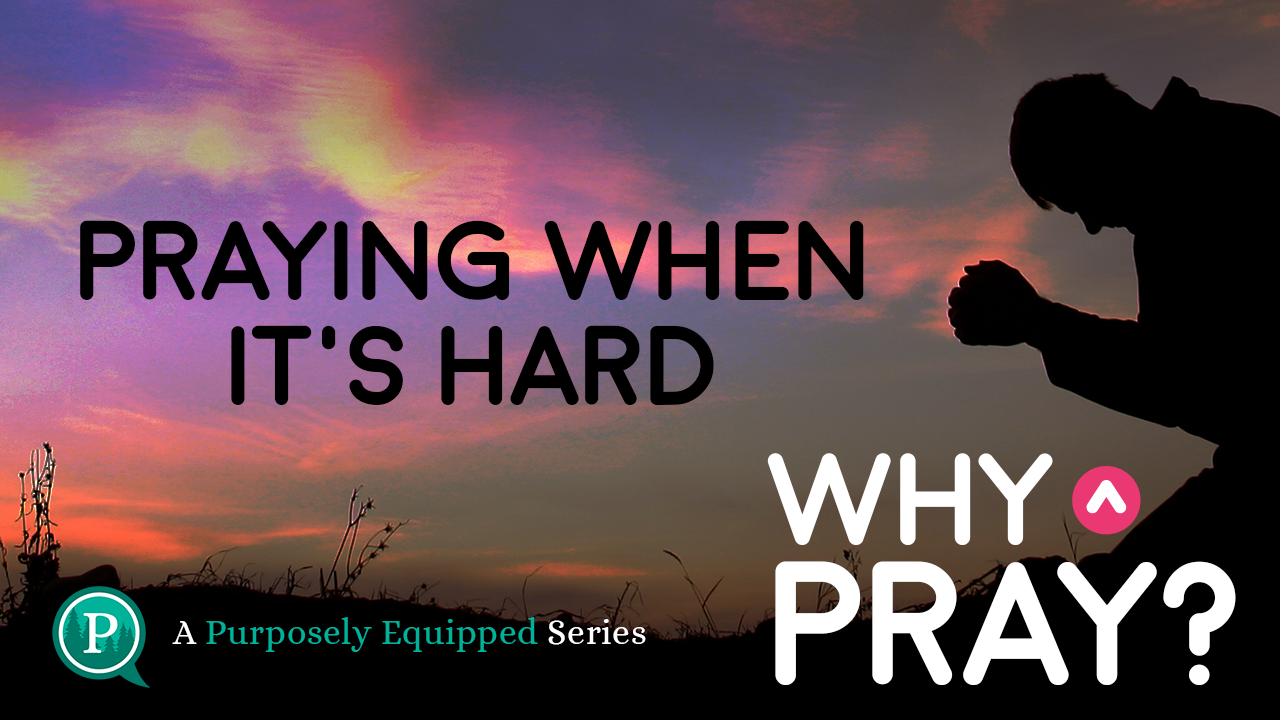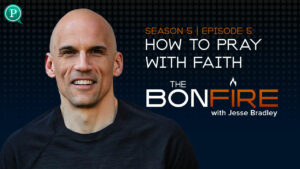We are moving into the fourth part of our prayer series as we dig into a really important topic. How do we pray when we are at a loss? How do we pray when it’s just really hard? You might want to talk to God but you just can’t find the words because you are in a rut, or things in your life are really difficult. What should you do?
Show Links:
Transcription:
Purposely. Your life. God’s purpose. Listen at onpurposely.com.
Narrator: Welcome to Purposely Equipped. We want to help you go deeper in your faith by learning truth from the Bible. Our new series, Why Pray?, will help us discover what the Bible has to say about the importance of prayer in building our relationship with Jesus. Pastors Wyatt Martin and Steve Brooks from Alderwood Community Church, will be helping us with this five-episode series as we look at Why Pray?
Wyatt Martin: All right, so Steve, we’ve covered what prayer is. Covered why we pray, how we pray. Getting a little bit more specific in this episode, and I’m excited to talk about this one because it’s just so real for so many of us. I mean, all of us at certain times in our life. How do we pray when it’s hard? How do we pray when we are either in a hard time of life where, you know, our circumstances are hard? We’re going through a trial and maybe we’re mad at God. Maybe we’re disappointed. Maybe we don’t feel like talking to God because we don’t like him very much right now, if we’re, if we’re honest. You know, how do, how do we pray when we’re just kind of at a loss. I mean, we just don’t know what to talk about. We don’t know what to say. You know, we feel maybe unworthy to, to talk to God. I mean, there’s all kinds of reasons why it might be hard, but that’s kind of our topic for today. And, I mean, if you had somebody come into your office and sit down on your couch and say, you know, Pastor, Steve, I’m just, I’m in a rut right now. I mean, I just, I got this thing going on in my life. I don’t feel like talking to God about it. What, what should I do? How do I pray when it’s hard?
Steve Brooks: Yeah, I think, I think we gotta break ’em down a little bit, you know? You just named several, I mean, just identifying what is making it hard. I mean, we, we asked, you know, why we pray, this is kind of why we don’t pray, right? So, like, I, I’m thinking of one I heard just fairly recently that you kind of touched on there, where somebody says I believe in God, but I’ve made a mess in my life. It’s my fault. I’m not going to ask God for anything, because I don’t really deserve anything. I know he is going to take care of me, but that’s as far as it goes.
Wyatt Martin: Yeah, that, I mean, so shame. Feeling like I just don’t have any standing to talk to God. I don’t deserve it. So, I’m just gonna keep my distance. Yeah. So, I mean, what, what did you say to that person?
Steve Brooks: It comes back to expectations. I think, you know, expecting that I have to somehow be worthy to be heard. I mean, it sounds so flippant, you know, and when you’re not in that frame of mind, it’s really easy to just look at that person and say, don’t, you know, the gospel? The gospel says you’re coming because you’re not worthy. You’re coming because you know, Jesus. But just really trying to hear somebody out, hearing their circumstances, but also trying to correct that misperception, that wrong expectation that God expects me to come with all my stuff taken care of before he is going to listen to me.
Wyatt Martin: Yeah. I mean, I think I would really think it’s important just to start with some of what you are saying in that situation, which is understanding that there is something that needs to be corrected. If, if you’re in a situation where prayer is hard, where you don’t have a desire to pray, you feel like you can’t pray, you feel like God is distant. He’s not there. First, is just recognizing something’s off, something’s off. This isn’t how it’s supposed to be. I mean, you know, this is there, there is something to wrestle with something to, you know, go back to the scriptures and, and understand about who God is and what prayer is. I, it’s not off because prayer is just always supposed to easy, but the reason why prayer is difficult is there’s something spiritually going on in your heart, there’s something spiritually going on in your mind, that there’s a problem to address. And this is where we, you know, we’ve, we’ve been using the Lord’s prayer as our example, and I think, and you brought out so helpfully, Jesus needs you to pray, our father, this communal idea of prayer. This is where I would really encourage somebody. You need the church, like when you’re having a conversation with somebody to say, Hey, like let’s remember the gospel together. Let’s remember that we’re in a relationship with God because of Jesus. Because of the cross that even though you’ve maybe messed up in a big way, and that’s real, that doesn’t actually change your standing before God, because of Jesus. And if we don’t go to the church, if we don’t go to brothers and sisters in Christ, if we don’t hear good biblical teaching from a church and, you know, share our life with other brothers and sisters, if you’re just on your own, you can sit in that spot for a really, really long time and just flounder.
Steve Brooks: Yeah. It’s interesting how many people I’ve run into over the years too, who feel so awkward? Praying in public. I mean, for you and me, we grew up, like you alluded to earlier in Christian homes, i, I grew up in a home where we constantly were praying for meals, and it wasn’t uncommon to pray before going on a trip or something like that. So, it’s not odd to us, but. I think we really have to work as a church to foster that kind of community. And man, there’s nothing worse than that, like overly religious person who makes the new believer, or the person who’s new to the group feel like, oh, I can’t pray in that flowery language, you know? Yeah. You’re right. So much healing in hearing other people pray how they express themselves to God and hearing other people pray for you.
Wyatt Martin: That’s huge. I mean, that’s huge. That’s, that’s one of the other things I think I would tell somebody who’s saying, I just, I feel like I can’t come to God because I’ve really messed up in a big way. I’ve sinned my life. I’m, you know, I’m a mess. Asking people to pray for you and with you would be a huge step. Where, where maybe you don’t feel like you even have the words to say to God, you don’t even know how to express the pain that you’re feeling. To hear somebody else speak truth in life, over you, and to come to the father with you on your behalf, verbally with you, such a huge way, I think of you kind of being brought to God in prayer, even if you aren’t capable of getting there on your own.
Steve Brooks: Yeah. Kind of like the paralytic when his friends lower him through the roof to Jesus. That’s a great picture. Okay, Pastor Wyatt, well, let me, let me put one back on you here. I mean, I woke up this morning, went for my morning walk. It was a surprisingly pleasant June morning. And I just flat did not feel like praying. I just woke up with sort of this emotional malaise. And it just was really, really hard. Yeah. I wanted, I wanted to turn on a podcast, but I hadn’t charged my Air Pods overnight, so, I was outta luck. That was maybe divine intervention; it might have been. So, so what about that situation?
Wyatt Martin: Yeah, so. You know, going back to what we said earlier, that I think is a symptom of something going on in your soul. Like I, and so if, if you have, if this is a normal thing for you, I just don’t feel like talking to God. I just don’t feel like praying, do not chalk that up to just like, I’m just not the kind of person who prays. Yeah. Or, you know, oh, well, I, I just won’t pray now. You know, I think just like when your body sends you signals of pain, to tell you say something’s up, maybe you should, you know, figure something out. Like if your elbow’s killing you. It could be something that is actually worth going to a doctor. Maybe getting a split, maybe getting an x-ray. Like, this is the kind of spiritual indicator in my mind of something going on. Maybe minor, maybe big, maybe sin, maybe not sin. You know, maybe I, I think it’d be worth spending some time reflecting on okay, what’s going, what’s going on in my life right now? What what’s going on in my mind? What am I preoccupied with? Why is it that I don’t feel any desire to be with God? Is there some unconfessed in my life that’s causing me to want to keep distance from God, because I know if I go to him, he’s going to point it out?
You know? Is there something in my life where I’m really hurt right now for some reason? And you know, that’s maybe keeping me from wanting to be with God. So, I ask that question, what is it that’s going on? And, and that again, like, and I don’t want to be a broken record that may not be something that you can do on your own. That may be something that you need to process with the church, with your small group, with a counselor, with, you know, somebody who loves Jesus and loves you and who, who you can talk with. The thing I’d say is don’t beat yourself up about that. You know, I think there’s this shame spiral that can happen with
prayer where, you know, you don’t feel like praying or you haven’t been faithful and praying regularly, and so, you feel bad about that. And that shame actually will keep you from praying also. And so, you know, you just kind of spiral into this feedback loop of not wanting to be with God. And so, I, you know, I would point, I would point you back to the gospel. I’d point you back to just the fact that the reason why you have this relationship with God is ability to come into his presence is because of Jesus, and what Jesus has done for you. That God looks on you with love and with grace, mercy and compassion and, and desires relationship with you. And so, keep at it.
Steve Brooks: I like your analogy earlier of, you know, the physical analogy, when you feel some ache or pain. Like for me this morning, it, for one thing, it took some time. You know, I just, thankfully I had the time to be out on a nice leisurely walk and just, it took me a good 20 minutes to kind of talk myself out of that funk and say, it’s okay. You know, I was, I was expecting somehow that because the weather was nice, my spirits were going to soar. And if prayer would just come so easily, and, and it didn’t. It took me a while to kind of get my, my head in the right space. But I was also thinking of a, of a scripture that is so helpful here, because you know, we mentioned this earlier, I mean a lot of people have struggled with this very, very godly people. And I love this scripture from Paul himself. You know, one of the godliest men who’s ever walked the earth in Romans eight, he says the spirit helps us in our weakness. We do not know what we ought to pray for, but the spirit himself intercedes for us through wordless groans. And he searches our hearts, knows the mind of the spirit because the spirit intercedes for God’s people in accordance with the will of God. Like, my fumbling words, and even sometimes silence, the holy spirit is translating that to God, in words of praise. And I also know Hebrew tells us that Jesus is constantly interceding for us. So, that’s like a huge reminder for me. It just gets me outta my funk that I’m not doing this on my own. Yeah.
Wyatt Martin: That’s huge. Yeah. And, you know, I might also say in that moment, not knowing what to say, not having a desire to, to share anything with God in that moment. Maybe it’s a time to listen. Maybe it’s a time to just be quiet before the Lord and ask him to speak. To ask him, to bring to mind what he desires for you to be thinking about and, you know, take some of the pressure off of you to have this list of things that you need to be talking to God about right now. And to just spend some time, just it’s, you know, some people call this practicing the presence of God, right? Just simply being aware of God’s presence and letting that be enough in that moment. And, you know, we talk about relationship and prayer. That’s a very relational thing to do. You know, when you, when you have a deep relationship with somebody, you’re not necessarily talking to them all the time. Sometimes you’re just together. You know, I’m thinking of my relationship with my wife, Kate. I mean, we would drive each other crazy if we were talking to each other all the time, you know? And I’m not saying that you’re going to drive God crazy, but I’m just saying, you know, it’s part of being a relationship it’s just being together, and, and maybe that’s enough for a morning like that when you don’t have a burning desire to talk with God. To just, to just bring your attention to him. To just, you know, be aware of his presence in your life.
Steve Brooks: Let me take a little bit of a hard right here. I mean, what if we’re talking to somebody who’s just finding it incredibly difficult to pray, because they have been through an almost impossibly painful situation. I mean, you and I both know people who have been through really tough situations, like losing a child or losing a loved one. Even long-term job loss and losing homes. I mean, you pray, it seems like God doesn’t answer, or he doesn’t answer the way you’d hoped. You just feel let down. How, how does somebody like that get out of that?
Wyatt Martin: Yeah, so hard. I mean, because there’s more than one thing going on there. There’s just your own emotional state of going through whatever that is. I mean, yeah. Losing a child. The weight that, that is on your soul, just the depression, even of going through something like that can just take the energy away from wanting to do anything spiritual or otherwise. Right. And so, there’s that aspect, but I think another big piece of it is that for many people, there’s an anger in that.
Yeah. You know, there’s an idea that, why would I want to talk to God when he just did this to me? Like, you know, why would I have any desire to be with him if this is how he’s treating me? That could be the source of anger. There also could be just a little bit of futility, maybe, maybe not anger, but just why bother talking to God if he couldn’t stop this from happening, you know?
So, maybe you don’t blame him for doing it, but you’re just like, if he, I mean, if he didn’t keep this thing from happening, why would I bring anything else to him after this? And I just would start by saying, I wouldn’t come to that person with a really neat and tidy, theological answer. You know, I, what I would, what I would do, hopefully, is to sit with that person, mourn with that person, to pray over that person, to pray for that person.
But as maybe God gives me the opportunity to think through this theologically, with them at some point to encourage them and shepherd them, you, you brought up the idea of expectations and what prayer is. And I do think that that is at play here. Prayer isn’t ultimately about getting God to give us what we want or protect us from everything that might harm us. It is about relationship. And so, you know, you may have desperately asked for God to protect you from a terrible thing that ended up happening to you. And his answer was no. His, his, he, he allowed it to happen. But it if you desire a relationship with him, if you see him as a father, I think the question then becomes, okay, this, this terrible thing did happen. Do you want to walk through that with God, or do you want to walk through that alone? And so, I think prayer at that point just becomes, God, I need you to get me through this.
Steve Brooks: We mentioned those basement psalms earlier, I read a little bit from Psalm 88. I mean, you know, we talk about Christ to think about Jesus in the garden, at that lowest, hardest point of his life as he was facing the worst possibly imaginable, painful death on the cross. You know, calling out to God, if it’s possible, take this cut from you. But we also see him after that prayer was answered with a no on the cross. even saying my God, my God, why have you forsaken me? Which is almost paradoxical. Right? He feels like God has left him, but he’s still calling out to God. And I just, the model of that, like you said, going through that pain with God, even when it feels like you’re doing it without God, is modeled by Jesus. You know? It’s, it’s a painful road to walk.
Wyatt Martin: Yeah, absolutely. I, I don’t think there’s any neat answer to that question. You know, there’s nothing that’s going to, that’s going to make that become an easy situation. But I think hopefully this is where you can remember the truth, and have the truth spoken to you, that God is good. Terrible things happen in this, in this world. Terrible evil happens in this life. We will experience the pain of that many times in our life. But God is good, and that truth hopefully can keep you tethered to him in prayer, even in the midst of a hard situation that you know, God promises that even in the worst things, he will work for good. For those who love him and are, are called according to his purpose. He hasn’t abandoned you. He hasn’t given up on you. This terrible thing didn’t happen to you because God doesn’t like you, or is done with you, or rejects you or anything. He still is close to you. He hasn’t forgotten you, and so the invitation is still there to be close to him, even in the midst of pain and mourning. God says that he’s close to us in our morning.
Steve Brooks: Yeah, there’s a great psalm that talks about how God is very near in the time of need. I mean, one of the things I can say for this, and I have not been through the kind of pain that some of the people you and I have talked with in our own offices have been through, losing a child or anything like that. And we’ve had some deep disappointments of course, but that’s the times when you discover some of those promises about God, and even who he is that are so precious. Like I’ll never forget the first time I read, I think, the end of Isaiah, where Isaiah says about God, in our distress, he was distressed. You know, sometimes we just picture God as like the cosmic clerk who takes our complaints. Or, you know, he’s like our Congressman and we write him a letter. I mean, he’s, he is there as a loving father to listen, to love, to never leave even in our hardest moments. And he doesn’t always offer an explanation. Or maybe the explanation. 10 years down the road.
Or in eternity. Yeah. I mean, I think that’s the other thing I’d say is sometimes it’s in our hardest moments that it’s most difficult to step back and see bigger picture things. And I, and I think I might, you know, Encourage somebody to allow their mourning, to allow their disappointment, to allow their anger to drive them to pray how the book of revelation and the whole scriptures end, to just pray, Jesus come quickly, you know? Come Lord Jesus to, to long for the renewal of all of things. To long for the day when pain and sin and death will be no more. And that doesn’t do anything about your current situation, doesn’t fix any of the problems, but it is a way of just staying connected to God in the midst of that. To say, okay, my hope really is in the, the new heavens and the new earth, and I don’t know how I’m not going to have pain. I mean, if you’ve gone through a really terrible thing, you’ve lost a child. If you’ve, you know, gone through an abusive situation of some kind, like, I don’t intellectually know how in the new heavens of the new earth, I will still remember that’s happened, but it won’t cause me pain any longer. I just know the promise that, that Jesus is going to wipe away every tear. That he’s going to end pain and death. That, that in the new heavens and new earth, things will be made whole again, and we can long for that. And even in our, in our mourning,
Wyatt Martin: I go back to that picture of Jesus in the garden, you know, and, and maybe the one expectation I would underline more than any other here, in the context of prayer is expecting that it’s going to be easy. Or that it’s always going to be easy. There are moments of prayer, I mean, I’ve had ’em in my life, you’ve had ’em in yours when God has just done incredible things and just praise, you know, bubbles out of you. You can’t control it, but those dark moments, Jesus, literally sweat drops of blood because he was so overcome by the pain and the stress that was prayer for him. Prayer can take that form too. And yet God was with him through that.
Steve Brooks: Well, maybe I’ll just close this episode and say a quick prayer for people who are in that spot right now. Awesome. Lord, I, I just asked. For those listening to this podcast right now, wherever they are, whatever they’re going through, people who have been in maybe the hardest time of their life just recently with unimaginable pain, with hurt and with this appointment. God, I pray that you would draw very near to them right now. That you would give them a sense of your presence of your love for them. That, that you are with them in the valley of the shadow of death. That you haven’t forsaken them. And Lord, I pray that you would surround them with your church, with brothers and sisters in Christ, with people to speak truth, to point them back to Jesus. And God, I pray even though it may be impossible to imagine what it might look like, that you would, as you’ve promised, work for good, even in the midst of this terrible thing. Lord, we love you and we are grateful that you never abandon us. So, thank you for the truth of Jesus.
Narrator: Again, special thanks to our hosts for this series, Wyatt Martin and Steve Brooks from Alderwood Community Church. Don’t forget to follow their podcast, native exiles, in any podcast app, or go to native exiles.com, where they look at living as everyday followers of Christ in the world today. If you are looking for a church to call home, check out Alderwood at alderwood.cc.
Thank you for downloading, Why Pray?, a Purposely Equipped series. Let’s keep growing in our faith together. Purposely Equipped is part of Purposely, a podcast network with practical podcasts to help you find, and live, in God’s purpose for your life. Find more podcasts and faith resources at onpurposely.com.







